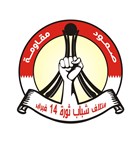On Monday hundreds of young Bahrainis poured into the streets in communities and villages across the small island country. Mobilized by decades of autocratic excess, torture, and years of anguish over the unfulfilled promises of political reform, the country’s activist community is struggling to tap into the revolutionary fervor that has gripped the Middle East in recent weeks and move forward a democratic agenda. They have made clear their desire to set aside an often paralyzing sectarianism that has recently divided the country’s Shiite majority from their Sunni rulers. Inspired by pro-democracy protesters elsewhere, they have also made clear their commitment to achieving their objectives through peaceful protest. Crowds swelled in the first half of the week as tens of thousands of demonstrators gathered to further press what is a bold agenda.
But a dark cloud is gathering over Bahrain. As has been the case elsewhere, the protests have been met with a barrage of choking tear gas, shotgun blasts, and craven police brutality. Bahraini security murdered two people in attacks on Monday and Tuesday, using live fire on unarmed demonstrators. The news out of Manama early Thursday morning is that things are quickly deteriorating further. Security forces attacked hundreds of sleeping Bahrainis who decided to camp out overnight in what some have taken to calling Martyr’s Square. The night-time raid was depraved, an ambush launched out of the shadows and in the weary hours of the early morning on unsuspecting victims, a gathering that included children. Although the country’s king offered condolences for the loss of life on Monday and Tuesday, it is clear with Thursday’s savage assault that he has chosen the path of violent and cowardly confrontation. For those activists who venture forth in the coming days, they will almost certainly face more of the same. Indeed, while there is considerable potential that the size of the protests will swell, there is also considerable potential for even more bloodshed.
Like those Tunisians and Egyptians whose examples inspired them, Bahrainis have and continue to hope that through the sheer force of numbers and sustained pressure they will succeed in pressuring the al-Khalifa to change. There is reason for guarded optimism. For now, their commitment to peaceful protest remains in place, although it will be tested after Thursday’s attack. Should they prove able to endure future rounds of violence, there is every reason to believe that the al-Khalifa will have to make concessions.
In the short-term, however, the stakes are very high and the path is fraught with danger.
As their counterparts in North Africa did, in these early days Bahrainis are facing a vicious attempt by state security forces to crush them. The violent gambit is a pathetic one, but it is also coldly calculated. And there are several reasons to think it may work. The most important is the nature of police and military power and its role in domestic politics. Where the Tunisian and Egyptian armies proved the ultimate power brokers in the revolutions there, there is no military to save the day in Bahrain. The means of violence are wholly controlled by the state and its security forces. The latter are thoroughly beholden to the royal family and not just willing, but eager to do its bidding. Where the Egyptian army was viewed by many Egyptians as a reflection of Egyptian society, the Bahraini domestic security apparatus is composed almost entirely of foreign mercenaries brought in to serve and destroy precisely because they have no local sympathies. There is no counterpart to the domestic security force, no alternative center of power that can challenge it or its masters. It has no rival. Bahrainis will have to endure the worst the police can mete out in order to carry the day.
Also absent for now from Bahrain is the kind of sustained 24 hour news coverage that dominated in Egypt and that, arguably, steadied the hands of the country’s military and even its police forces after its first attempts to bloody the pro-democracy forces there. Some members of the Western and Arab media are paying attention to events in the Gulf, but the difference in coverage is dramatic. With fewer eyes upon them, Bahrain’s rulers almost certainly feel they have a freer hand.
Also uncertain, but potentially key to a democratic outcome, is the US role. The White House has considerable leverage in Bahrain, but it is far from clear that the Americans will use it in order to protect the democracy movement there. Washington’s desire to see a democratic outcome in Bahrain is, in fact, unclear—much less clear than even its muddled stance on Egypt’s revolution. So far the White House has refused to stake out a precise position, at least in public, on the initial rounds of violence. The reasons why are not hard to discern. The US Navy’s 5th Fleet is headquartered in Manama, a key outpost from which the United States has and will continue to secure its “vital interests” (oil) in the Persian Gulf. It is hardly noteworthy to point out that the US has long preferred its oil producing allies to be authoritarian, lest control over oil fall into the hands of democratically elected governments that might not share American strategic or material interests. The Obama administration can and certainly should make clear to the al-Khalifa that the US prefers to see significant political reform measures implemented. The al-Khalifas are dependent on the US for regional security assurances and for considerable investment. American pressure could save Bahrain’s young democracy activists from their rulers. But if the US failed to muster the political will to be clear on Egypt, it may be too much to hope that it will do so in oil’s heartland.
![[Image Source: Unknown]](https://kms.jadaliyya.com/Images/357x383xo/BahrainProtests.jpg)










